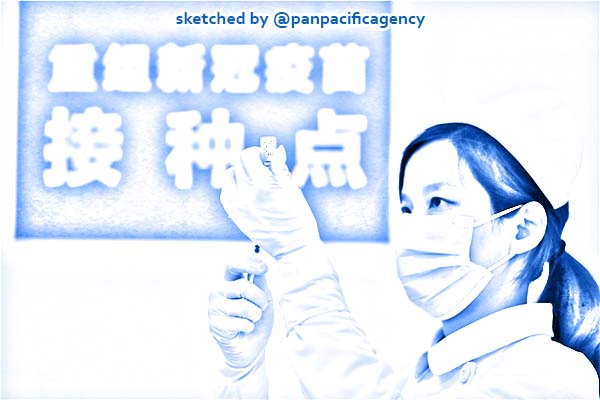Cambodia’s got coronavirus vaccines from China and India, but take-up is painfully slow

A medical worker extracts the recombinant novel coronavirus (COVID-19) vaccine into a syringe in Wuhan, Central China's Hubei province, on March 24, 2020. The first batch of 108 volunteers received inoculations after a clinical trial of the novel coronavirus vaccine in China kicked off on March 16. [Photo by Zhu Xingxin/chinadaily.com.cn]. Sketched by the Pan Pacific Agency.
PHNOM PENH, Mar 28, 2021, SCMP. Two months after Cambodia launched its Covid-19 vaccination programme with 1.2 million shots made by China’s Sinopharm and India’s Serum Institute-produced AstraZeneca vaccine, the government on Tuesday said garment factory workers, who number about 800,000 and are mostly female, could sign up to be inoculated.
But workers in the industry, which have suffered from fewer orders and disruptions due to the coronavirus pandemic and tariffs imposed by the European Union over human rights abuses, remain hesitant to come forward.
Keo Samouen, a local union leader at Phnom Penh’s Quantum garment factory, said the manufacturing line leaders among the 1,000 employees were asked to recruit volunteers for the vaccine. But in private conversations, the workers – who produce swimwear, men’s clothes and lingerie for brands including Marks & Spencer – tell her they didn’t trust it.
“Many workers in the factory told me that they’re scared of the vaccine [in general] and won’t vaccinate with it,” she said, adding that worries had been fuelled by rumours of people dying after receiving the shot.
Samouen said she was sure no one inside her factory was actively dissuading others to be vaccinated, and she personally preferred to “wait and see” how others reacted to the vaccine.
“It is not any incitement or urging anyone, as we have our own thoughts,” she said.
Cambodia, which has a population of about 16 million, has reported more than 2,000 infections and 10 deaths and has struggled to get buy-in for its immunisation programme launched in early February.
The government began by offering free shots to civil servants and journalists in February, and by early March started giving to those aged over 60 in coronavirus hotspots like Phnom Penh and Sihanoukville, as well as foreigners working for the United Nations and other international organisations.
Representatives for the World Health Organization (WHO) and Unicef, which helped bring some of the jabs to Cambodia, did not respond to questions about vaccine distribution or who is considered eligible. But as of Wednesday last week, fewer than 250,000 people had volunteered to get vaccinated, with 229,000 people given a first shot.
Another 1.5 million doses from Beijing-based Sinovac arrived on Friday and 700,000 doses from Sinopharm are set to arrive on March 31.
The vaccine hesitancy displayed by Cambodians is echoed across the world, with governments battling to tackle fake news and anti-vaxxers, while urging those sitting on the fence to make a move amid limited supplies. Some, like Hong Kong, have dangled the promise of fewer social distancing restrictions while the EU is looking into making travelling easier with vaccination passports.
But in Cambodia, Ou Virak, an analyst and founder of local think tank Future Forum, said the concerns had to do with Sinopharm vaccines not yet being approved by the WHO.
It did not help that while 75-year-old Defence Minister Tea Banh received the Sinopharm jab, Prime Minister Hun Sen, 68, and his wife got the AstraZeneca vaccine due to reports suggesting the Chinese brand was not as effective for older people.
The government has also cracked down on rumours rather than focusing on clarifying them. A Chinese journalist based in temple town Siem Reap was deported last month for fake news over a story headlined “Cambodia Sells Covid-19 Vaccine Donated by China.” And this week, police arrested a TikTok user who told workers not to get the vaccine, with a Labour Ministry official posting on Facebook, urging workers to report anyone they see who’s advising others not to vaccinate.
Said analyst Virak: “Naturally there is a lot of scepticism from the Cambodian public.”
But he felt it made sense to vaccinate factory workers because they worked in proximity to each other and were needed to keep the US$7 billion industry, a major contributor to the economy, afloat.
It would also make sense to vaccinate market vendors and drivers in addition to the elderly and those with pre-existing conditions, Virak said, though he agreed it might be difficult to overcome hesitancy towards the vaccines as the country bought more doses from China.
The bid to vaccinate people has taken on more urgency of late as Cambodia is seeing a surge in daily cases on the back of infections that was thought to have begun at a nightclub in February but was later traced back to women who escaped quarantine soon after they entered the country earlier that month. Since then, a number of clubs, casinos and condominiums that infected individuals visited have been closed.
NagaWorld, Phnom Penh’s one-and-only casino complex, was also shut on March 2, five days after guests tested positive and infected nearly a dozen employees. More than 1,000 workers stayed home from the casino after realising their peers were infected, and the gaming complex later closed after the union-led boycott was publicised.
Quarantining at home, NagaWorld union leader Chhim Sithar said the Hong Kong-listed company eventually agreed to answer workers’ demands for their March salaries, but no benefits so far. She said she wasn’t sure if the union would ask for vaccines yet and a decision would be made later.
“After the garment workers have vaccines, it may be a good time to talk about vaccines,” Sithar said. “But I’m still concerned because a lot of senior citizens haven’t had vaccines yet.”